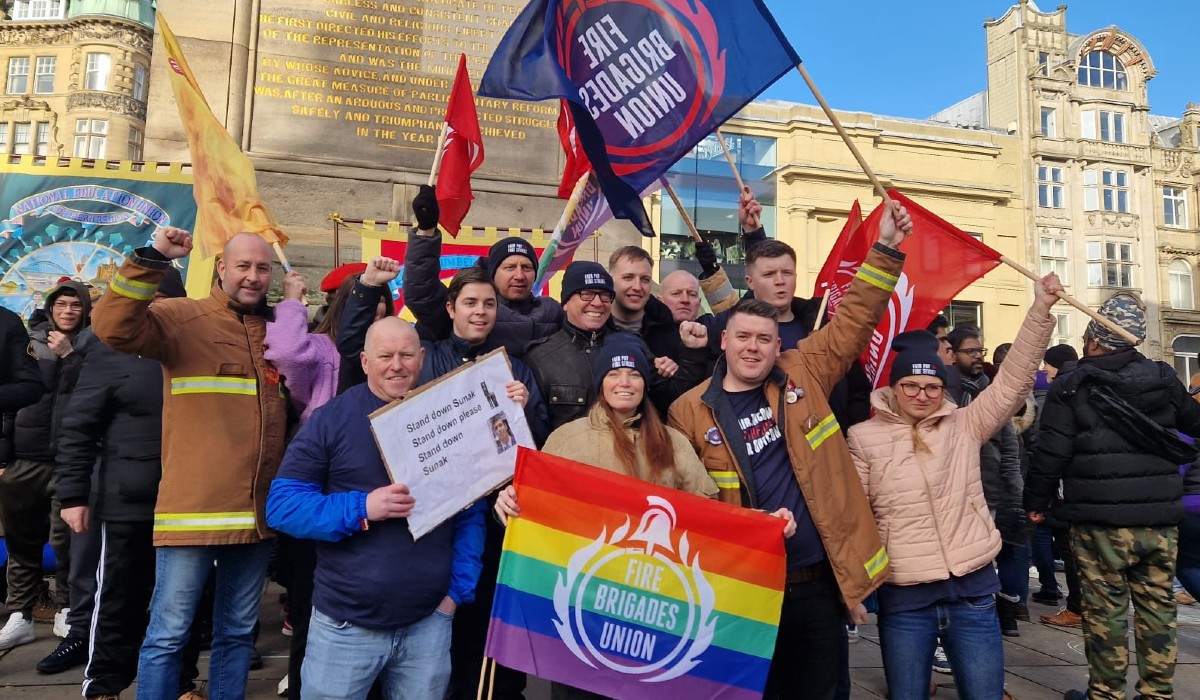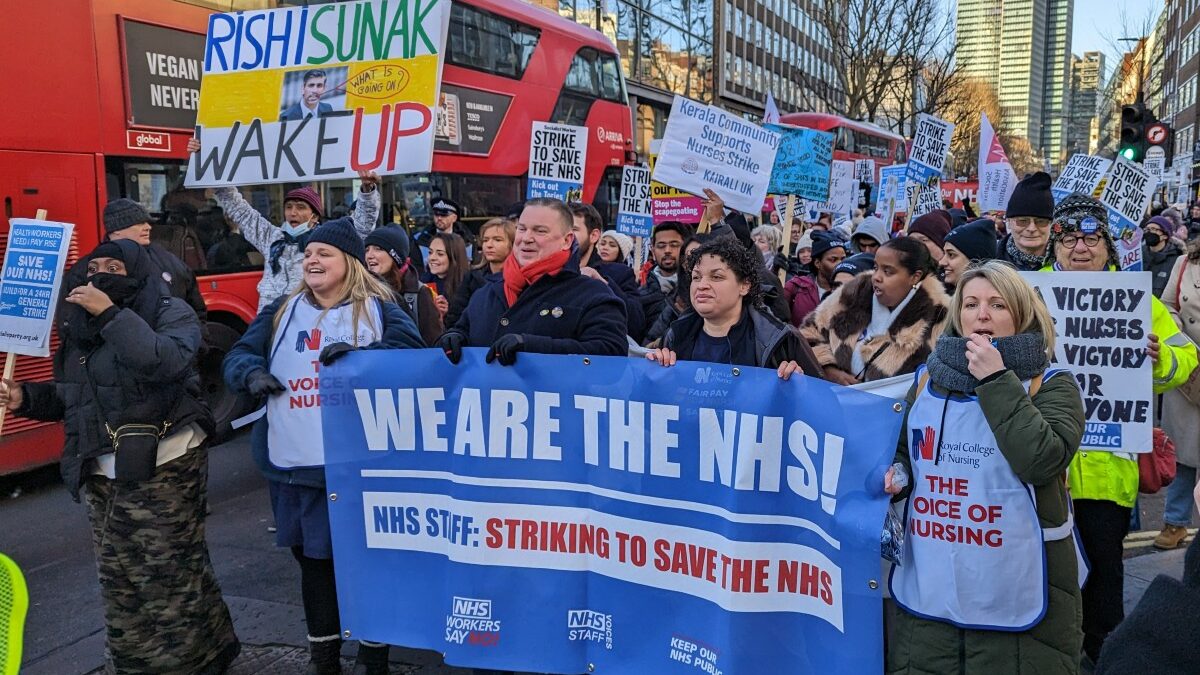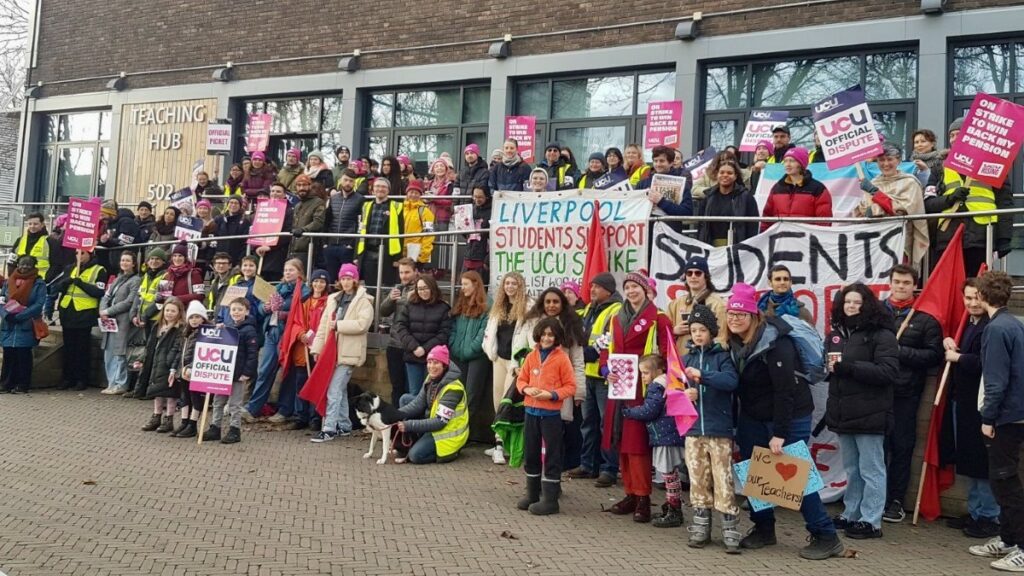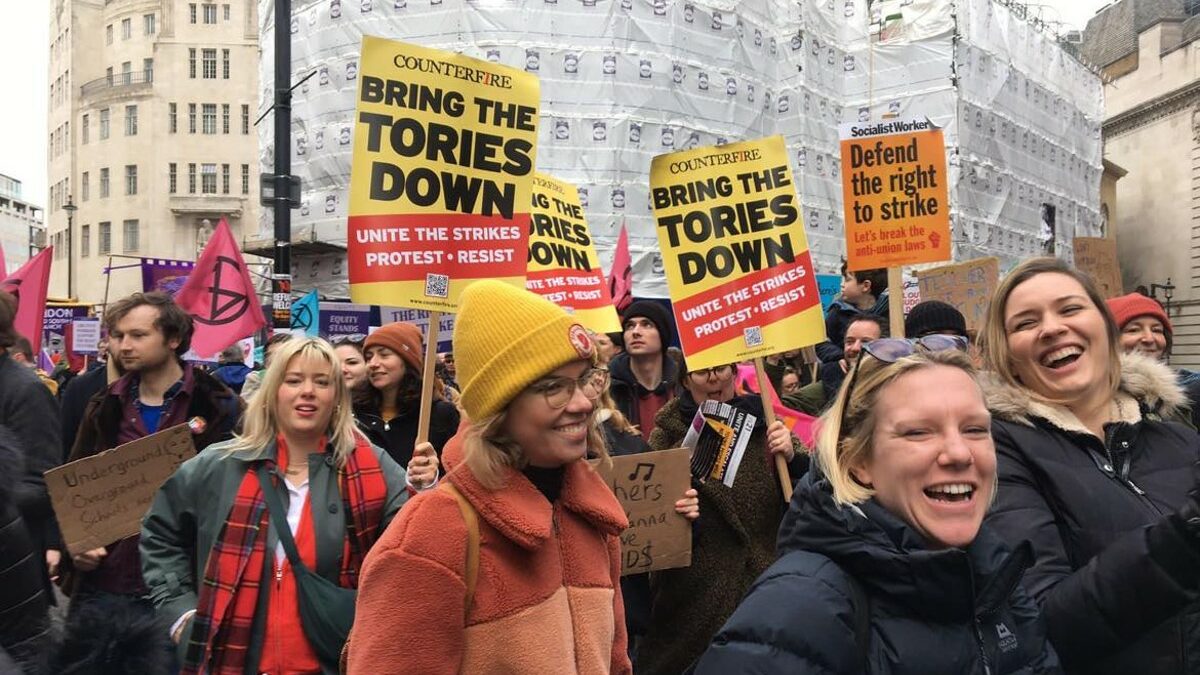 FBU members rallying on 1 Feb. Photo: 'fbunational / Twitter
FBU members rallying on 1 Feb. Photo: 'fbunational / Twitter
Counterfire’s weekly digest with the latest on strikes and workplace struggles
You can sign up to receive News from the Frontline straight in your inbox
The Fire Brigades Union (FBU) announced on Monday 30 January that their members have voted overwhelmingly for strike action. On a 73% turnout, 88% voted yes to taking industrial action. This result smashed the threshold set for emergency works in the 2016 Trade Union Act.
This dispute is not just about the below-inflation pay offers that they have received, this is also about the effects of austerity on the fire service. Firefighters have seen job cuts since 2010 that make their jobs even more dangerous.
Austerity in the fire service is a danger to the public and it is a danger for FBU members. Firefighters also have a significantly higher risk of developing cancer and heart attacks and strokes than the general public.
No strike dates have been announced by the union, but they have said that they will wait until 9th February to call any action to give the government and employers time to put a better offer on the table.
Matt Wrack, General Secretary of the Fire Brigades Union, said:
“Firefighters across the UK have spoken. This is an overwhelming vote for strike action against an offer which would mean further significant cuts to real terms wages for firefighters and control room staff. They have already lost at least 12% of the value of their pay since 2010. The responsibility for any disruption to services lies squarely with fire service employers and government ministers. Rishi Sunak’s government has refused to make funding available for a decent pay offer to firefighters and control staff.
“The government and the employers have the power to stop strikes from happening by making a credible offer that can resolve this dispute. The ball is in their court.”
In two separate ballots, control room staff in Northern Ireland and North West England also voted for strike action.
This action by FBU members is a significant step in the fight against austerity and for safe staffing levels in the fire service. And we should all be standing in solidarity with the FBU in this dispute, their fight is our fight.
British Museum strike looms
Over 100 PCS workers at the British Museum will take seven days of strike action over pay and working conditions from 13-19 February, coinciding with half term.
The workers are fighting for a 10% pay increase, pensions justice and job security.
Environment Agency unions to strike on 8 February
Environment Agency staff represented by the trade unions Prospect and Unison will stage a 12-hour stage on Wednesday 8 February starting at 7am.
Members of both unions will also be taking action short of a strike in the hours leading up to the walkout and after it finishes. For 12 hours either side of the strike, the workers, who do river inspection, flood forecasting, coastal risk management and pollution control, will be working to rule by withdrawing from incident response rotas.
Both unions have agreed ‘life and limb cover’ with management.
Prospect general secretary Mike Clancy said:
“Low pay, under-resourcing and under-staffing mean it’s almost impossible for Environment Agency staff to properly inspect, regulate and protect the natural environment. This has resulted in problems including sewage discharge and pollution of waterways, which will only get worse unless action is taken. To protect the environment, regulators must be properly resourced. That means fair pay and recruiting and retaining a skilled, experienced workforce. If that doesn’t happen, the regulator can’t do its job, and everybody suffers.”
Unison head of environment Donna Rowe-Merriman said:
“Communities across England are kept safe because of the tireless efforts of Environment Agency workers. Staff shortages and persistent underfunding have left the Agency in a difficult place, without the employees to meet the growing challenges posed by climate change. It’s in everyone’s best interests that a solution is found quickly. The government must act now to get talks in motion that could prevent further escalation.”
Unison members held strike action on 18 January following action short of a strike in December and Prospect members at the agency have been taking action short of a strike since 19 December 2022.
Biggest strike in NHS history
6 February will see the ‘biggest NHS strike in history’ according to Unite as nurses and ambulance workers take coordinated strike action.
Paramedics, emergency care assistants and call handlers represented by Unite and GMB will join RCN nurses in a mass walkout as the government continues to rule out meaningful negotiations over pay and working conditions.
Following a revised offer from the Welsh government, the RCN and GMB have called off their strike action in Wales, but Unite ambulance workers will still be out on strike. Unite carrying on with the planned strike suggests the new offer is probably not worth calling off a strike with two days’ notice and risk dampening the momentum and the building of united action.
Members of the Chartered Society of Physiotherapy will be out on strike on Thursday 9 February, and Unison ambulance workers will be out on strike on Friday 10 February.
While the 6th will be the biggest NHS strike day, there was room for far more coordination. The health unions need to work together, as well as look to generalising the struggle and maximising solidarity by joining together with non-health unions – on 15 March for example.

Abellio bus drivers vote on 13.5% deal
Unite is balloting over 2,000 drivers employed by Abellio in London on the latest offer from the company. When the dispute started, ten weeks ago, the pay for time-served drivers was £15.22. The latest offer takes that to £18.00.
An offer of 12.9% was thrown out a month ago, because it didn’t address the issues of new starters’ pay, nor drivers TUPE’d across from the RATP bus company. That has now been settled, and the current offer is worth 13.5% over last November.
But the company has created a rod for its own back. It unilaterally implemented a pay rise (rejected by the drivers six weeks ago), thinking that would take the wind out of the strikers’ sails and weaken the will to fight. Unfortunately for Abellio, that has come back and bit them on the backside because the latest offer, which was recommended by the reps, was rejected on a straw poll at 4 of the 6 garages affected. As a rep explained to NFTF:
“This deal gives us an above-inflation deal, but members are looking at it as a rise on current pay, forgetting where we started from. That’s the company’s fault for playing silly b****rs.”
The union is currently balloting the members on the offer. With 22 days of strike action under their belt already, it’s a question of whether the stomach is there for raising the stakes, or settling for the considerable gains on offer, and, as the rep told us, “Getting our breath back, and preparing for another scrap in 9 months’ time.”
18 days of UCU strikes gets underway
The university lecturers’ union UCU has given Vice-Chancellors notice of 18 days of strike action across February and March, the first of which started this week.
While a fresh round of strikes is welcome there is little sign that the UCU leadership is fully committed to victory. The hope is that the 18 days of strike action, beginning on 9 February and ending on 22 March, will give Vice-Chancellors plenty of time to get around the negotiating table.
However, as the VCs are the grand beneficiaries of the business model of higher education, they are not going to give in to demands that challenge the education-for-profit system easily. UK universities collectively had an income of £41.1 billion last year with Vice-Chancellors creaming off £45 million between them.
The strike days will impact staff and students disproportionately across the sector. For example, part-time staff who teach on Thursdays are going to miss most of their teaching time in the strike period, and while the hardship fund will help, UCU are offering no guarantees about how those teaching positions will be defended if there is a post-strike witch-hunt.
The UCU leadership needs to grasp the nettle. In order to reverse the cuts to pay and pensions, as well as confront the disgrace of students paying extortionate tuition fees, all-out action is needed. The message needs to move from pleading for negotiations to a real commitment to fight for higher education free from profit. Read more analysis by Counterfire’s UCU members here.

Midwives will ballot
Midwives in Northern Ireland are voting on whether to strike as RCM director for Northern Ireland Karen Murray said no one wants to strike but that her members have been “pushed into a corner, with no other way to express their frustration and anger.”
The ballot runs until 7 March, coming after a consultation in November showed overwhelming support for action if a 4% pay deal were to be forced on them.
Journalists fight for local broadcasting
Members of the National Union of Journalists (NUJ) at the BBC are striking against job cuts at the BBC.
In a cost-cutting move, the BBC intends to substantially reduce local radio content production, potentially leading to dozens of permanently lost jobs across both Britain and Northern Ireland. There are also plans to close local TV production in Cambridge and Oxford. The corporation claims that local broadcasts, the radio component of which in particular attracts millions of listeners, can be substituted for by vastly cheaper online content.
Appeals have gone to the media regulator about the significant impact that this loss of service will have, but in the meantime, journalists are preparing themselves to take action. Following 70% plus consultative ballot results, the action is likely to happen in mid-March, significantly impacting BBC broadcasts.
Hydro workers’ power
Engineering workers at three Scottish hydroelectricity power stations operated by Drax Power are preparing to take industrial action.
The Unite members have voted to reject an 8% pay offer from the employer – which is enjoying bumper profits due to the soaring cost of energy and the fact that gas prices do not impact the expense of hydroelectric power.
The workers are poised to strike in March if the employer does not return with a plus-inflation offer, which they have yet to do.
CWU announces new Royal Mail strike
The CWU has announced that its 115,000 members working for Royal Mail will strike for 24 hours on 16 February 12:30pm to 17 February 12:30pm. The resumption of strike action comes after negotiations have stalled and Royal Mail have made it clear that there is no good faith on their part.
The union is currently re-balloting its members to renew its strike mandate and the results will be announced on the strike day on 16 February. The initial strike ballot last year delivered a massive yes vote and hopefully the re-ballot will deliver another strong vote for strike action, showing the bosses that the workers aren’t backing down.

Unite health and social care strike
Unite members working in health and social care in Northern Ireland have announced strike dates for 16, 17, 23 and 24 February after rejecting another real-terms pay cut.
This follows action taken in January with Unite general secretary Sharon Graham saying:
“Unite’s members have voted overwhelmingly for strike action and rejected the government’s derisory pay offer, which is a real terms pay cut. These strikes are being taken as an absolute last resort.
“Our members are seeing the NHS eroded before their eyes and patients’ lives are being placed at risk due to chronic underfunding. In the absence of a functioning Stormont executive, the responsibility for this strike lies squarely with Rishi Sunak who has failed to show leadership and ensure that NHS bosses made a realistic offer to the workers who keep our health and social care services running”.
Steelworkers strike of the century
Hartlepool’s venerable Expanded Metal Company has experienced its first strike for a hundred years this week.
Metallurgy workers in GMB – itself having deep roots in the metal trade – have rejected a 5.7% pay offer and have been holding lively, colourful picket lines on the normally sleepy industrial estate. The dispute continues.
Doctors in BMA ballot
BMA senior doctors are to vote on strike action this month in an indicative ballot over pay and pensions.
The BMA says consultants have experienced a real terms pay cut of 35% since 2008 and many have had large tax bills on their pensions resulting in many leaving the NHS or cutting their hours.
Meanwhile, junior doctors are voting to strike, with their ballot closing on 20 February. The BMA has said if the ballot result meets the threshold there will be 72 hours of strike action in March.
500,000 workers strike
1 February saw over 500,000 workers take strike action, hundreds of demonstrations around the country and tens of thousands on the streets of London, read reports from across the country here and John Rees’s analysis of the strengths and weaknesses of the day here.

5 things to do this week:
- Get down to your nearest RCN, GMB and Unite picket lines on Monday 6 February, RCN picket lines on Tuesday 7 February and CSP physiotherapists’ picket lines on Thursday 9 February.
- Pass a motion supporting the 11 March SOS NHS national demonstration in your trade union branch
- Donate to the UCU strike fund.
- Donate to the RCN strike fund.
- Watch The Lost World of Red Robbo
Join Revolution! May Day weekender in London
The world is changing fast. From tariffs and trade wars to the continuing genocide in Gaza to Starmer’s austerity 2.0.
Revolution! on Saturday 3 – Sunday 4 May brings together leading activists and authors to discuss the key questions of the moment and chart a strategy for the left.

